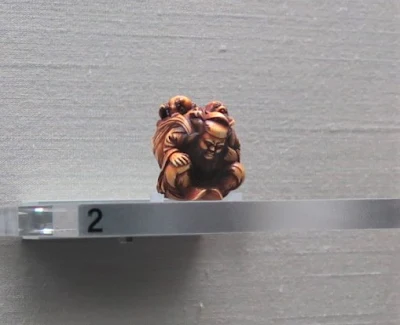These 3 cm sculptures are both netsuke in the shape of the demon queller Zhong Kui on show at Tokyo National Museum. One was carved by Jugyoku from ivory in the 19th century and the other carved by Ryukei from wood also in the 19th century.
Zhong Kui is a deity in Chinese and Japanese mythology, known as a vanquisher of ghosts and evil beings and reputedly able to command 80,000 demons.
In the current Japan, however, Zhong Kui is mainly known as "Shoki-san," a small sculpture placed on the roof of old wooden houses in Kyoto and Nara (so-called "machiya") to ward off evil sprits. I went to Kyoto and Nara twice a year before CIVID-19, but don't remember seeing one at all. So, I will go there definitely again after the pandemic to see Shoki-san.
- Symbol of Peace? - Netsuke & Halloween
- Japanese Saying: Netsuke Titled "A-Hum"!
- Netsuke - Japanese Lovelorn Ghost Puts a Curse Saying "Urameshiya..."
- Kawaii Two-Legged Yokai Goblin Netsuke Sculpture
- Kawaii Netsuke Jedi
- Watermelon Netsuke Carving With Makie Lacquer Painting
- Netsuke "Jurojin God"
- Netsuke "Dog Days"
- Netsuke "Muskmelon"
- Netsuke and Jello "Goldfish"
- Netsuke/Ojime "Wild Boar, Baby Boars"
- Gourds in Various Forms - Netsuke, Pickle.....
- Netsuke "Sheep"
- Netsuke "Boss"
- Netsuke "Fukurokuju God"
- Netsuke - Japanese Lovelorn Ghost Puts a Curse Saying "Urameshiya..."
- Kawaii Two-Legged Yokai Goblin Netsuke Sculpture
- Kawaii Netsuke Jedi
- Watermelon Netsuke Carving With Makie Lacquer Painting
- Netsuke "Jurojin God"
- Netsuke "Dog Days"
- Netsuke "Muskmelon"
- Netsuke and Jello "Goldfish"
- Netsuke/Ojime "Wild Boar, Baby Boars"
- Gourds in Various Forms - Netsuke, Pickle.....
- Netsuke "Sheep"
- Netsuke "Boss"
- Netsuke "Fukurokuju God"
- Netsuke "The Poet Hitomaro"
(If you wish to post your comment but don't have a Google account, select "anonymous" from the drop down menu titled "comment as"!)
鐘馗さんというと京都や奈良の町屋の屋根の上の魔除けの置物を連想するのですが、本来は鬼をも食べてしまう神様で、とっても怖い方のようです。
根付がお好きな方は以下の記事もどうぞ!
- 人麻呂牙彫根付
(Google アカウントを持ってない方は、コメント記入後に「Google アカウント」をクリックし、「匿名」か「名前/URL」を選択してからご記入ください!)






0 件のコメント:
コメントを投稿